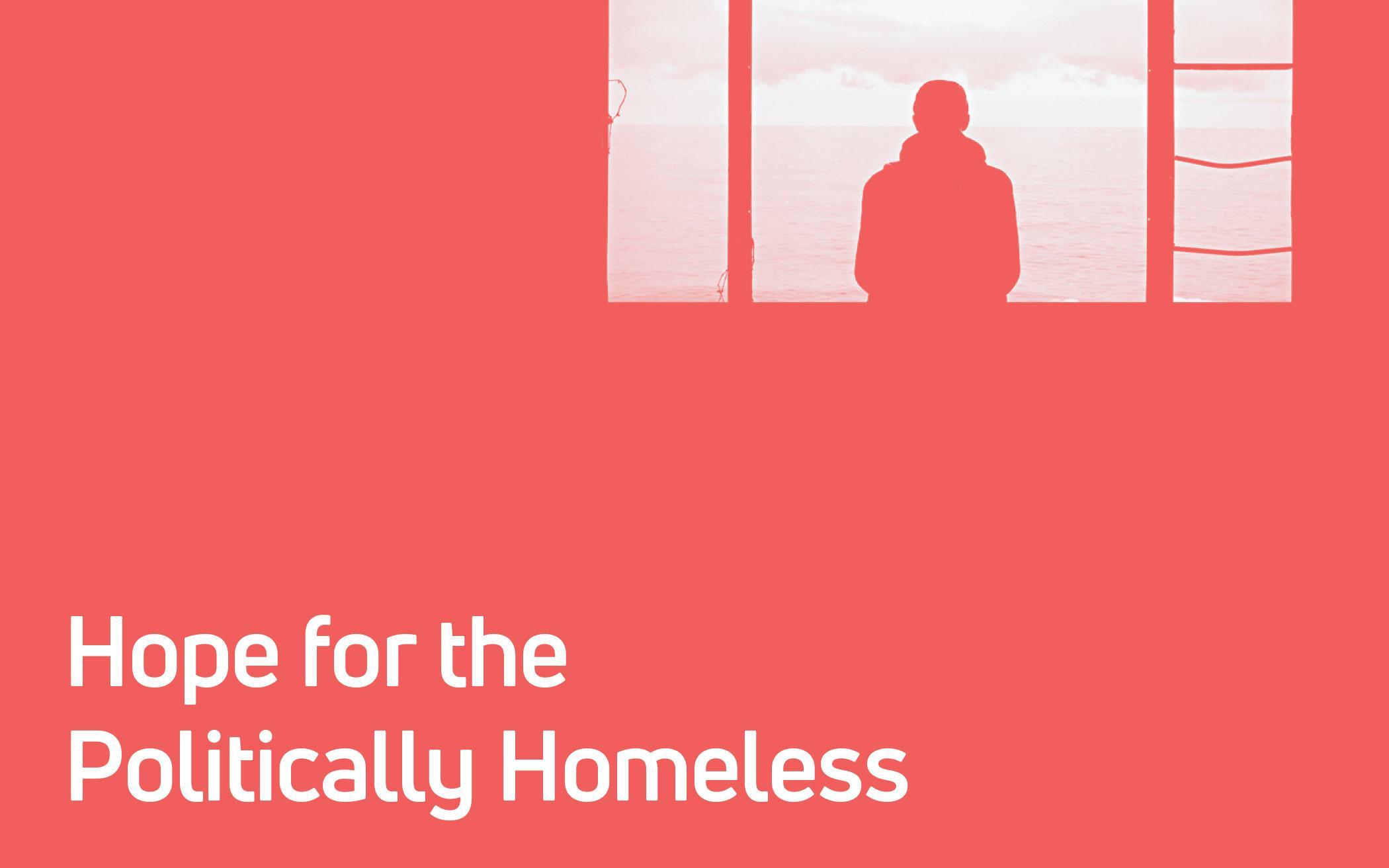The world today feels as divisive as ever, with a variety of topics pitting neighbor against neighbor and even Christian against Christian, as many cling to their tribes while others find themselves without a political home. Where does that leave us as Christians? How do we move forward together? The Banner teamed up with the Center for Public Justice to release a series of articles exploring these topics. This is the last of six. To read the first five, visit thebanner.org/tags/political-home.
For Christians in North America, navigating politics in 2020 might feel like navigating a minefield. Whether in our homes, congregations, or workplaces, engaging in politics can be fraught with risk, division, and contempt. To make matters worse, many Christians don’t feel their views are adequately represented by any one political party or platform. Too conservative for progressives and too progressive for conservatives, many Christians describe themselves as feeling politically homeless.
What happens when one feels politically homeless? As Kerwin Webb explored in this series’ opening article online, “A Politically Homeless Generation,” political homelessness can often lead to checking out of political engagement altogether. It can also lead to a sense of deep frustration and questions of identity. Those seeking to find a home or a primary identity in politics will ultimately be frustrated when no leader, platform, or party adequately represents all of their viewpoints.
How can Christians model and practice faithful engagement in public life without putting our ultimate faith in politics, political parties, or leaders? We believe there are biblical principles that point us toward a hopeful vision of Christian civic engagement.
As Christians, we are called to seek the well-being and flourishing of our neighbors and communities. This is often accomplished through our churches and through community-based organizations. Yet without a political dimension—attention to the role of government and public policies that affect the daily lives of our neighbors—the work of loving our neighbor is incomplete. Addressing racial and socioeconomic inequalities exposed by COVID-19, for example, requires that public policies are made and administered with justice.
How can Christians who feel politically homeless engage faithfully and hopefully in their political communities in this moment?
Creation, Fall, Redemption
Many Christian Reformed members are familiar with the biblical framework of creation, fall, and redemption. For us, political homelessness results from Christians getting stuck on either the original goodness of creation or the seemingly impenetrable brokenness of sin. Political homelessness happens when Christians fail to fully recognize Christ’s redemptive work and participatory invitation in every area of human life, including politics.
The antidote to political homelessness is to focus on Christ’s redemptive calling for us to reform every area of life toward his image. In his book Healing for a Broken World, Stephen Monsma writes, “Since Christ’s work of redemption is ongoing, and since Christians are agents of that redemption, the profound and powerful conclusion is that we are called to be God’s agents of reconciliation in all aspects of life (including politics).” Let us unpack the framework of creation, fall, and redemption.
Creation
God created the world—not just individuals, but the physical environment too—and called it good. God created humans in God’s own image and gave them the capacity to fulfill multiple roles at once in differentiated areas of life, such as family, workplace, church, school, politics. In doing so, God created not just individuals but the communities in which we live. God had good purposes for these institutions. This is perhaps most clear in the primacy of institutions like families and worshiping communities. We see God’s inherent goodness in these places and God’s perfect vision for these communities to be places in which we bear God’s image. But God’s good purposes also extend to government and to our role as citizens shaping our political community. In short, there is no part of our lives and communities, including government, that is apart from God’s goodness.
Fall
But then the fall happened. It affected every area of life, including all individuals and all institutions. We know the effects of sin, of being separated from God, affect not only our personal walks of faith. Brokenness as a result of sin affects God’s original good purposes for every community, including communities of believers. Despite God’s perfect purposes for family, for example, divorce, child abuse, trauma, economic hardship, substance use, and other symptoms of sin and brokeness pervade this institution. The fall also affected government and political systems. Corruption, injustice, greed, racism, and many other challenges stain not just our individual hearts, but our institutions, including the institutions that make up political communities.
Redemption
Thankfully, that is not the end of the story. God sent God’s son, Jesus, to die for our sins. This is the heart of the Christian gospel, and for many Christians the most immediate and resonant effects of the redemptive nature of the gospel (rightly so) are in our personal relationships with God and each other. However, Jesus’ redemptive work is also present and aspirational in every community of responsibility in which we are called to take part. This includes shaping healthy governments and political communities.
Christ’s redemptive work in the world recognizes the goodness of the structures God created to administer justice, but also the need for healing and redemption in these same structures because of systemic sin. Sin is present because of the fall, but that is not the end of the story. Christ’s redemptive invocation calls us to recognize God’s good purposes for government and urges believers to seek a hopeful, renewed vision of justice.
When individuals experience political homelessness, they might believe the existing political systems are working well enough for them and their interests. But Christ calls us not just to dwell in God’s creation as “good enough,” but to continue to seek the betterment of every human institution in which we fulfill our responsibilities.
Christians experiencing political homelessness also might get stuck in the hopelessness many of us feel when we see systemic sin, especially when apparent in institutions like government and political parties. It’s hard to resist dwelling on the fallenness of public officials, public policies, and government. But when Christians linger in paralysis rooted in the belief that politics is irretrievably broken, they fail to see the restoration the gospel calls for in every area of human activity, including politics. Christians are called to move through the narrative of creation and the fall toward redemption. Christians must resist accepting the status quo as “good enough” and the belief that our political systems are so distorted by sin that they are not worth trying to redeem.
That’s easier said than done. But here are some biblical principles with applied examples of how to move out of political homelessness into a realistic, yet hopeful engagement toward redeemed political systems.
Principles to Guide Christians in Public Life
In Healing for a Broken World, Monsma calls Christians to focus first on identifying normative biblical principles relevant to government and public policy. Only after such principles have been developed should we turn to specific policy prescriptions and implications. We believe this is an approach that politically homeless Christians should follow.
When asked what the greatest commandment is, Jesus replied, “‘Love the Lord your God with all your heart and with all your soul and with all your mind.’ This is the first and greatest commandment. And the second is like it: ‘Love your neighbor as yourself’” (Matt. 22:37-39).
How might we derive guiding principles from these two commandments to love God and to love our neighbors? Here are some possibilities:
The command to love God presupposes that humans have religious freedom. No one can come to know and accept Christ as their Savior through governmental coercion. The principle of religious freedom is essential for the fulfillment of Jesus’ command to love God with everything we have.
Redemptive public policies should, as a baseline, work from the principle that all humans and the groups they form have the freedom to embody their most sacred beliefs. For Christians, this requires us not only to uphold public policies that protect our own freedom to live out our love of God. This principle also calls Christians to advocate for public policies that protect the freedom of other individuals and groups with different beliefs and practices. This extends not only to explicit religious acts, like worship and prayer, but also to how individuals and groups engage in service and citizenship.
What does this look like in practice? Christians should first recognize they cannot advocate for the religious freedom of other people if they don’t have some basic literacy regarding the spiritual beliefs and practices of others. Christians cannot advocate for religious freedom for their Muslim, Buddhist, or atheist neighbors when they don’t understand the basics of what these individuals need to freely exercise their faith.
For example, last spring, in response to COVID-19, the U.S. Congress passed the CARES Act. Among other provisions, the CARES Act made available to small businesses and nonprofits—including congregations and faith-based organizations—potentially forgivable loans to cover basic payroll and operations expenses during the height of the pandemic. In our work at the Center for Public Justice, through dialogue with Muslim faith-based organizational leaders, we learned that there was some concern that Muslim organizations would not be able to apply for such loans because if the loans were not forgiven there would be a small interest rate attached to them. Muslims are forbidden to take or pay interest. Since the CARES Act program is essentially an interest-bearing loan, it becomes difficult for Muslims to participate. As a result of this conversation, we were able to connect Muslim leaders to appropriate public officials tasked with ensuring regulations did not violate religious freedom for them. Upholding just public policies requires that Christians advance religious freedom, even and especially for those with whom we disagree.
The call to love our neighbor also requires that we honor and uplift the human dignity of every person. We do this because every person is created in the image of God. When looking at any public policy proposal, we ought to ask if it seeks to honor and uphold the dignity of those affected by it.
Jesus calls us to treat others as we would like to be treated (Matt. 7:12). In terms of how this principle applies to shaping public policy, Christians should consider not only how policies affect their own interests, but also how these policies affect the interests of neighbors, especially the most marginalized.
What does this look like in practice? One example is a group of young Christians in New Jersey. Michael, a recent Princeton Theological Seminary graduate, led a small group of his fellow students through an 11-week curriculum that equips participants to advocate for a local issue of the group's choosing and culminates with the group meeting with a public official. Michael’s group decided they would focus on the issue of cash bail reform in their community.
None of the group’s participants were directly affected by the public policies governing cash bail, and yet they asked themselves how they could advocate for policies that would more closely reflect how they would like to be treated in this situation.
“Individuals and families with fewer financial resources available to them are often unable to post bail in order to get themselves or a family member out of jail after an arrest.” Michael said. “This is a problem because an inability to post bail results in separation from familial support networks and job loss, which creates deficits in social and financial capital, further perpetuating poverty and socioeconomic inequality.”
Michael’s group was surprised at how easy it was to schedule a meeting with a public official—in this case, the office of New Jersey’s attorney general—to advocate for the wellbeing of their neighbors.
These are only a few examples of how Christians are applying the biblical principles of love of God and love of neighbor to their public policy engagement. But engaging to shape just public policies that reflect Jesus’ redemptive call is not an all-or-nothing endeavor. Christians, together and in their current spheres of knowledge and influence, can make small steps toward enacting change.
It is often said among social workers that people do not experience physical homelessness because they run out of money, but because they run out of human relationships and social networks that offer meaningful support during difficult periods. This model can be applied to those experiencing political homelessness as well.
People do not experience political homelessness only because they do not see political candidates, policies, and party platforms that perfectly align with their own beliefs. Christians might experience political homelessness because they have few redemptive spiritual supports to continually redirect them to Jesus’ command to participate in his redemptive work in the world, loving God and loving our neighbors in every area of our lives. But through a redemptive lens, Christians can seek biblical principles rooted in Jesus’ two greatest commandments—love of God and love of neighbor—to form just public policies. Christians can also form communities of support that work together to advance justice in incremental and attainable ways, one conversation across differences and one meeting with a public official at a time.
Discussion Questions
- Do you feel yourself “politically homeless”? Why or why not?
- The authors argued that Christians need to advance religious freedom not only for Christians but for all religions. What are some reasons you have for agreeing or disagreeing?
- The authors derived two of many possible principles from the commandments to love God and our neighbors, namely religious freedom for all and human dignity for all. What other possible principles can you derive that might be applicable to our political engagement?
- If we try to avoid political homelessness, how do we avoid the other extreme of politically fusing our faith to one political party or ideology?
About the Authors
Chelsea Langston Bombino is director of Sacred Sector, an initiative of the Center for Public Justice. She also serves as an adjunct professor at Pepperdine University and serves on the board of several nonprofit organizations, including First Amendment Voice and Young Leaders Institute.
Katie Thompson is the program director and editor of Shared Justice, the Center for Public Justice’s initiative for people in their 20s and 30s who are passionate about exploring the intersection of faith, justice, and politics. She is co-author of Unleashing Opportunity: Why Escaping Poverty Requires a Shared Vision of Justice with Michael Gerson and Stephanie Summers.







